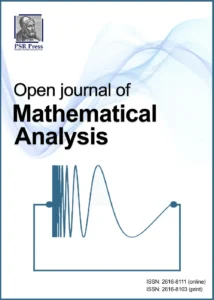The Open Journal of Mathematical Analysis (OMA) ISSN: 2616-8103 (Print), 2616-8111(Online) is an international peer-reviewed journal dedicated to the publication of original and high-quality research papers in mathematical analysis, broadly defined in abstract and applied settings. Since its inception, OMA has established itself as a venue for both foundational and innovative contributions in analysis.
- Open Access: OMA follows the Diamond Open Access model—completely free for both authors and readers, with no APCs. All articles are accessible online without financial, legal, or technical barriers, ensuring global dissemination of mathematical research.
- Visibility: Articles are published online immediately upon acceptance and included in an annual printed edition in December, maximizing reach across digital and physical formats.
- Rapid Publication: Peer-review decisions are provided within 4 to 12 weeks, with accepted articles published online promptly.
- Scope: Publishes original research and survey articles in mathematical analysis, covering broad and abstract topics, including reviews of progress over the past three decades.
- Publication Frequency: One volume with two issues annually (June and December), with a printed edition released in December.
- Indexing: Indexed in ROAD, FATCAT, ZDB, Wikidata, SUDOC, OpenAlex, EZB, and Crossref, ensuring visibility and scholarly reach in multiple international platforms.
- Publisher: Ptolemy Scientific Research Press (PSR Press), part of the Ptolemy Institute of Scientific Research and Technology.

